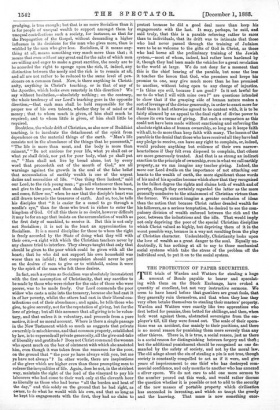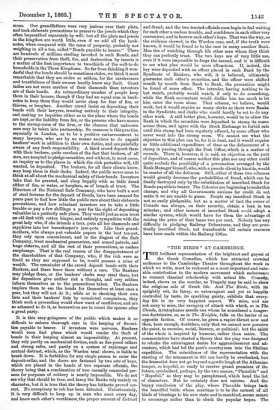THE PROTECTION OF PAPER SECURITIES.
THE trials of Warden and Watters for stealing a huge amount of Bonds payable to bearer and speculat- ing with them on the Stock Exchange, have evoked a quantity of excellent, but not very instructive sermons. We seem to have heard before that gamblers are great fools, that they generally ruin themselves, and that when they lose they very often betake themselves to stealing their masters' property. Warden and Waters were exactly like two apprentices who first betted for pennies, then betted for shillings, and then, when luck went against them, abstracted sovereigns from the em- ployer's till, till they were found out. The scale of their opera- tions was an accident, due mainly to their positions, and there is no moral reason for punishing them more severely than any other thieves. There is, it is true, a social reason, just as there is a social reason for distinguishing between forgery and theft ; but the additional punishment should be recognised as one de- manded by the safety of society, and not by the moral law. The old adage about the sin of stealing a pin is not true, though society is constantly compelled to act as if it were, and give years of imprisonment to one thief who has destroyed com- mercial confidence, and only months to another who has annexed a silver spoon. We do not care to add one more sermon to the number poured out this week, and would rather discuss the question whether it is possible or not to add to the security of the new masses of portable property which civilisation has succeeded in inventing, and which so tempt the greedy and the knowing. That mass is now something enor-
mous. Our grandfathers were very jealous over their plate, and took elaborate precautions to preserve the jewels which they often bequeathed separately by will; but all the plate and jewels in the kingdom are worth little, even if we add all the bank- notes, when compared with the mass of property, probably not weighing in all a ton, called" Bonds payable to bearer." There are hundreds of millions sterling invested in such Bonds, and their preservation from theft, fire, and destruction by insects is a matter of the first importance to two-thirds of the well-to-do households in the Three Kingdoms. So far from thinking it won- derful that the bonds should be sometimes stolen, we think it most remarkable that they are stolen so seldom, for the carelessness and trustfulness of their owners hardly know any limit. Great ladies are not more careless of their diamonds than investors are of their bonds. An extraordinary number of people keep them in their houses, though if they had an equal sum in bank- notes to keep there they would never sleep for fear of fire, or thieves, or burglars. Another crowd insist on depositing their bonds with their lawyers, trusting entirely to their integrity, and making no inquiries either as to the place where the bonds are kept, or the liability from fire, or the persons who have access to the strong-room of the firm, or the chances that unknown men may be taken into partnership. So common is this practice, especially in London, as to be- a positive embarrassment to many lawyers, who are by no means anxious to do unpaid bankers' work in addition to their own duties, and are painfully aware of any fresh responsibility. A third crowd deposit them with their brokers, quite careless of the fact that brokers, of all men, are tempted to pledge securities, and without, in most cases, an inquiry as to the places in which the rich portables will, till wanted, be deposited. The brokers, for all their clients know, may keep them in their desks. Indeed, the public never seem to think at all about the mechanical safety of their bonds. Investors take that for granted, and sleep happily with as little dread either of fire, or water, or burglars, as of breach of trust. The Directors of the National Safe Company, who have built a sort of steel fortress for the deposit of Bonds, have been amazed for years past to find how little the public care about their elaborate precautions, and how reluctant investors are to take a little trouble or pay a few shillings a year for the right of depositing valuables in a perfectly safe place. They would just as soon trust
an old desk with rotten hinges, and entirely sympathise with the great lady who, if she intends a tour, puts all her diamonds and
sapphires into her housekeeper's jam-pots. Like their grand- mothers, who always put valuable papers in the best tea-pot, they rely upon concealment, and to the disgust of the Safe Company, treat mechanical guarantees, and armed patrols, and huge cisterns, and all the rest of their precautions, as useless surplusage. That is the real reason of the disappointment of the shareholders of that Company, who, if the rich were as timid as they are supposed to be, would possess a mine of wealth. The remainder of the crowd deposit bonds with their Bankers, and there leave them without a care. The Bankers may pledge them, or the bankers' clerks may steal them, but the depositors give neither risk a thought, and very seldom inform themselves as to the precautions taken. The Bankers implore them to see the bonds for themselves at least once a year, but they will not do it ; while as to checking their own lists and their bankers' lists by occasional comparison, they think such a proceeding would show want of confidence, and are as ashamed to do it, as housewives are to count the spoons after a great party.
It is this easy-goingness of the public which makes it so difficult to enforce thorough care in the keeping of Securi- ties payable to bearer. If investors were nervous, Bankers would soon find plans which would render the theft of bonds in their keeping almost an impossibility. At present, they rely partly on mechanical devices, such as fire-proof cellars and strong safes, and partly on a system of espionage and mutual distrust, which, as the Warden trial shows, is liable to break down. It is forbidden for any single person to enter the deposit-cellar, and the doors are fastened by two seta of keys, which are placed in the hands of two separate officials, the theory being that a combination of two casually connected per- sons for purposes of robbery is nearly impossible. We do not see why that should be true, and fancy the Banks rely mainly on character, but it is true that the theory has hitherto proved cor- rect. No conspiracy to rob has been detected. Unfortunately, it is very difficult to keep up in men who meet every day, and know each other's worthiness, the proper amount of distrust and dread; and the two trusted officials soon begin to feel waiting for each other a useless trouble, and confidence in each other very convenient, and to borrow each other's keys. That was the way, as the evidence showed, in the Warden case, and, if the truth were known, it would be found to be the case in many another Bank. Men tire of watching through life other men whom they think they can perfectly trust. The two keys are of very little use, even if it were impossible to forge the second, and it is difficult to see what plan would be more efficacious. If, indeed, the key were deposited with an officer placed in each Bank by the Syndicate of Bankers, who will, it is believed, ultimately guarantee each other's securities, and the officer were shifted month by month from Bank to Bank, the precaution might be found of more effect. The intruder, having nothing to do but watch, probably would watch, if only to do something, while the Bank accountant would dislike him too much to let him enter the room alone. That scheme, we believe, would work, but it would require as many clerks as there were Banks in the Syndicate, and clerks who could hardly be set to do any other work. A still better plan, however, would be to allow the Bank in which the securities were deposited to stamp its name across them, and agree with the Stock Exchange to forbid. sale until this stamp had been regularly effaced, by some officer who never went into the strong room. We cannot see what the objection to this plan can be, for it is final, and it would require as little additional expenditure of time as the defacement of a stamp in passing through the Post Office, which is a matter of seconds. There is, however, it is said, an objection on the part of depositors, and of course neither this plan nor any other could quite exclude the possibility of a personation arranged by the Bank Manager himself, who, with a pseudo client by his side, would be master of all the defences. Still, either of these two scheme would greatly decrease the probabilities of fraud, which can be finally destroyed only by the substitution of inscribed Stock for Bonds payable to bearer. The Colonies are beginning to makethis change, and why all Governments anxious for credit do not make it we are unable to guess. People say inscribed Stock is not so easily pledgeable, but as a matter of fact the owner of
Consols can always, on their security, obtain a loan in ten. minutes ; and other issuers of inscribed Stock could adopt a.
similar system, which would have for them the advantage of raising the price of their loans two per cent. Nobody has any difficulty in pledging Railway Debentures, and they are prac- tically inscribed Stock, not transferable till certain erasures have been made within the Railway Office.







































 Previous page
Previous page